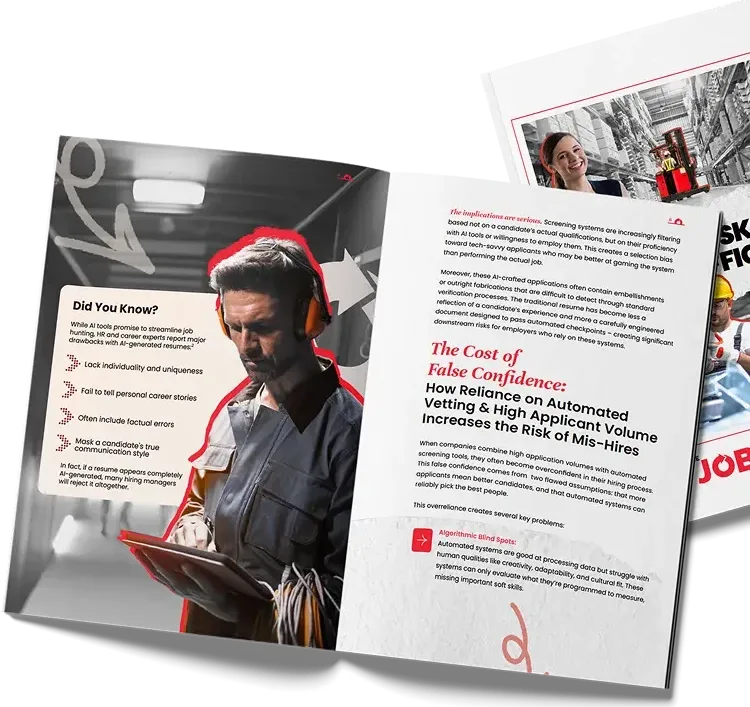Your Staffing Partner in Action: How We Help Employers Navigate Labor Market Challenges in Warehousing
The Bureau of Labor and Statistics reported an employment level of 6.6 million within the transportation and warehousing industry in the middle of 2024.¹ Despite expected growth trends, employers within this sector experience different obstacles specifically related to workforce demands.
From fluctuating needs to intense competition in the labor market, what can employers do to navigate labor market challenges? This article will dive into how staffing agencies can help warehousing businesses.
Top Workforce Challenges in Warehousing
Warehousing operations rely on a strong and adaptable workforce to meet demand, but several challenges make workforce management increasingly complex. From fluctuating labor needs to skill shortages, companies must navigate ongoing obstacles to maintain efficiency and productivity.
1. Fluctuating Workforce Demand
The warehousing industry faces significant challenges with workforce demands that fluctuate dramatically throughout the year. These fluctuations are usually driven by seasonal purchasing patterns that result in increased staffing needs.
Many warehousing operations struggle to scale their workforce up and down efficiently in response to these fluctuations. For example, some businesses end up with costly overstaffing, while others experience slower periods due to being understaffed during peak times.
The unpredictable nature of modern consumer behavior, coupled with increasingly short delivery expectations, has transformed what was once a predictable annual cycle into a complex staffing puzzle. These demand fluctuations create immense pressure on HR departments to maintain flexible labor pools while ensuring consistent operational performance regardless of volume changes.
2. Labor and Skill Shortages
The warehousing industry continues to face increasing labor shortages, putting operational capacity at risk. This shortage stems from multiple factors, such as demographic shifts and skill requirement mismatch.
Beyond simple headcount shortages, today's warehouse operations require professionals who are proficient with technological tools and equipment. They must be knowledgeable in data analytics and relevant management systems. Because of this, finding the right candidates becomes more difficult.
The combination of general labor shortages and specific skill deficits creates a challenging environment. It results in warehouse companies competing aggressively for a limited talent pool while maintaining and upskilling their current employees.
3. Training and Upskilling Needs
The rapid technological transformation of the warehousing industry has created a need for continuous worker training and upskilling. As previously mentioned, modern warehouses now incorporate technologies to improve their operations. From automated storage and retrieval systems (AS/RS) to complex warehouse management software, these tech tools require people who know how to use them.
Implementing warehouse automation requires comprehensive training programs that can transform traditional warehouse workers into tech-savvy logistics professionals. The challenge extends beyond initial training, as warehouses must establish ongoing education initiatives to keep pace with rapidly evolving technologies. This is the only way to ensure workers' skills remain current.
This continuous learning requirement creates significant operational challenges and labor shortages. Warehouses must balance productive work time against necessary training hours. This can often lead to temporary productivity dips during the implementation phases. Moreover, the financial investment needed can be too much for most businesses to cover.
What can staffing firms offer?
Warehouse efficiency is highly dependent on its people. To attain success in navigating labor challenges, it's best to consider utilizing the expertise of staffing firms. Gain the benefit of receiving customized workforce solutions such as:
1. Access to Pre-Screened Talent Pools
Staffing firms maintain extensive databases of pre-screened and vetted warehouse professionals. These talent pools are cultivated through years of continuous sourcing, from job boards to referral networks. Each candidate undergoes a comprehensive evaluation process that includes skills assessments tailored to warehousing competencies. Some examples of these are the capabilities necessary for forklift operation or inventory management systems.
Warehousing employers benefit from this solution, as it reduces time-to-hire metrics without compromising candidate quality. This leads to better hiring outcomes within a shorter period of time compared to traditional recruitment results. By leveraging a staffing firm's pre-qualified talent pools, warehouse operations can maintain productivity levels through acquiring high-quality individuals.
2. Rapid Workforce Scaling
Staffing firms specialize in quickly adjusting warehouse workforces to meet changing demand patterns. With their expansive candidate networks, they have the capacity to streamline recruitment infrastructure to deliver qualified personnel within tight timeframes. This rapid scaling capability is achieved through workforce planning systems that anticipate a company's seasonal needs.
Aside from placing the right people into open positions, staffing firms provide specific services that can help businesses scale down their workforce when necessary. Instead of hiring permanent workers who aren't needed after seasonal peaks, recruitment companies can connect warehousing businesses to temporary hires. This contributes to the ability of rapid workforce scaling based on the current demand of the market.
3. Reliable Recruitment and Onboarding Strategies
Staffing firms implement recruitment and onboarding strategies specifically tailored to warehousing environments. They employ industry-specialized recruiters who understand the technical requirements, physical demands, and cultural dynamics unique to distribution center operations. These strategies include comprehensive candidate evaluation frameworks that assess both technical competencies and soft skills critical to warehouse success.
Tested through trial and error and guided by industry expertise, staffing methods employed by recruitment firms can offer the best results. This is because standard recruitment methods often fall short when assessing candidates' capacity. This can ultimately result in early turnover when realities don't align with expectations. Similarly, inadequate onboarding leads to safety risks, productivity issues, and other integration problems that undermine operational efficiency. All of these can be avoided with the help of the right partner.
4. Ensured Compliance and Risk Mitigation
Staffing firms provide warehouse operations with comprehensive compliance management and risk mitigation services. What this does is effectively transfer significant portions of employment-related legal exposure from the client company to the staffing partner. These services encompass meticulous verification of work eligibility documentation, management of complex employment classification requirements, and even implementation of workplace safety protocols.
Staffing firms are able to mitigate risk by:
- Conducting thorough audits of compliance laws
- Developing customized risk management strategies that consider the specific context of their partners
- Monitoring any regulatory changes that might affect operations in the warehousing industry
By partnering with staffing firms that specialize in compliance management, warehousing operations can experience reduced administrative burdens on internal HR resources. They can also gain access to specialized expertise regarding warehousing-specific regulations. This can significantly lower exposure to misclassification claims and enhance overall workplace safety outcomes.
Overcome obstacles with The Job Center.
Here at The Job Center, we make it our mission to invest in relationships with both our clients and associates. We understand the value of the right connections between employees and employers. Through our staffing services, we aim to provide guidance and tailored solutions that can directly aid your business in reaching its goals and milestones.
Interested in learning more about how we can help you? Let's start a conversation today!
Reference
- Allard, Mary Dorinda & Keller, Kennedy. "Keeping America Moving: Employment in Transportation and Warehousing Industries."
Bureau of Labor Statistics, 29 July 2024,
www.bls.gov/spotlight/2024/keeping-america-moving-employment-in-transportation-and-warehousing-industries.
About
Joey Stoller
Other articles





